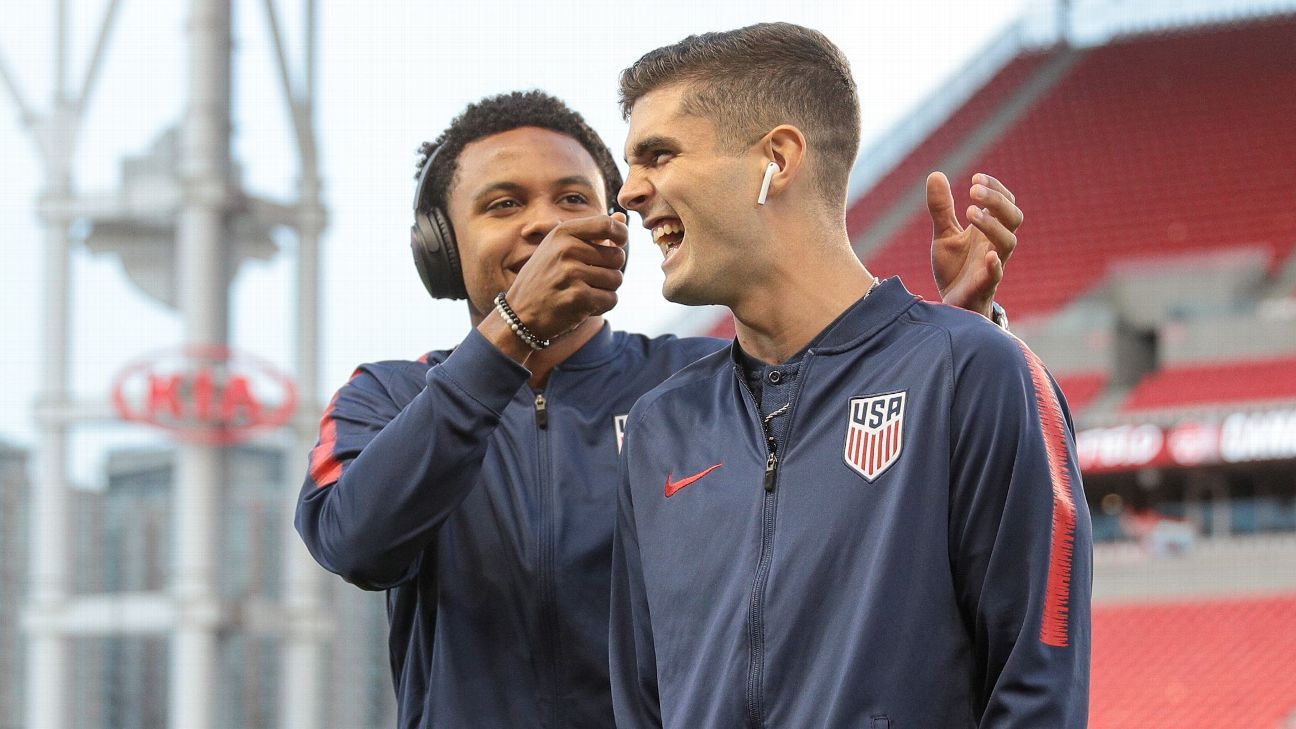
Juergen Klinsmann won the World Cup and European Championship with Germany during a glittering career in which he played for Inter, Tottenham and Bayern, among others. As a coach, he led Germany to a third-place finish at the 2006 World Cup and managed the U.S. men's national team from 2011-16. In addition to a column for ESPN.com, he appears as a pundit on FC Daily.
With the World Cup less than two years away, it is an exciting time to be a fan of the U.S. men's national team, which is developing the core of a team that can make a run in the tournament's knockout stage.
In the last 12 months, several players moved to clubs at the very top level in Europe and the experience they will get, playing in the best leagues and in the best competition in the world -- the Champions League -- is good news for the national team.
Christian Pulisic was at Dortmund and then joined Chelsea last year; since then, Giovanni Reyna has followed in his footsteps in Germany. Weston McKennie has moved to Juventus, Sergino Dest is at Barcelona and Tyler Adams plays for RB Leipzig.
None of these players is older than 22 and that is another major change from past generations of American players, who went to Europe after establishing themselves in Major League Soccer or playing at college. It is wonderful to see a lot of youngsters being courageous and giving it a shot at an earlier age than before.
- Stream ESPN FC Daily on ESPN+ (U.S. only)
- FC 100: Pulisic, Dest make the cut in 2020
Youth systems, academies and MLS deserve credit for their work with young players in this country. They learn a new culture in Europe, but Pulisic and Reyna, for example, have skillsets that were developed in America at 10, 11, 12, 13 years old. The success of U.S. U-17s and U-20s, which consistently get to youth World Cup knockout games, shows the talent that exists.
And the path to Europe continues to appeal; we hear good things about Bayern Munich's Chris Richards, who moved from FC Dallas, while this week Joe Scally signed for Borussia Moenchengladbach from New York City FC.
Germany is a good destination because there is open-mindedness to give youngsters playing time, but opportunities exist across Europe. Brenden Aaronson, for example, has gone from Philadelphia Union to Red Bull Salzburg in Austria, where he finds huge support from his coach -- and fellow American -- Jesse Marsch.
So how do you make the best chance to succeed at the top level? It is important to have good people surrounding you to help adapt to a new environment; Reyna is a good example, as his dad, Claudio, played in Europe and his mother -- Danielle Egan -- represented the U.S. women's national team.
You have to be open-minded, ready to learn and fight for a spot every day and understand that, sooner or later, "I have to kick someone in front of me out." If you have a setback, like an injury or a coaching change, understand that you have the ability to prove yourself all over again. It is natural for players to think about their own situation, which is why that support network is super important.
When you get a chance, take it! Reyna got his first Bundesliga minutes less than one year ago and has made himself a key player for Dortmund. Like Pulisic, he can play in different positions and that is a good thing because the chance increases to influence games; instead of being expected to score, there is opportunity to assist, pass well and create chances.
With young attacking players, change of pace is always an important characteristic. I saw it with Christian the first time I watched him when he was 15 or 16 and said this kid not only has very good technique, but he can 'jump' players in a split-second. Giovanni is very similar, though he is taller and has a different flow to his movement. Dest can also go by players in the first few yards.
That ability to create space is what a difference-maker needs to have in the opposing penalty area. To retain it, you must stay healthy and work hard on your body, stretch, get in the gym. Ensure your system is in a good shape because the moment a player loses his change of pace, he is at risk of becoming mediocre.
The Champions League restarts next month and is almost like a feeder system for a successful World Cup, which is why the big European countries, plus Argentina and Brazil, are contenders every four years.
Being involved in tactically advanced games will test their abilities, but also teach leadership and character qualities needed to negotiate the late rounds of a tournament. Without sustained competition in CONCACAF, American players must figure out a way to deal with World Cup knockout games, to reach and go beyond the fifth game, into semifinals and finals.
Playing every year in the Champions League will give you that knowhow, and that is why what I have seen developing over the last couple of years is so exciting. You are a child of your environment and if your environment is Barcelona, every year it is about titles; it is the same with Chelsea, Dortmund and others. At Juventus, McKennie plays for a team that has won the league nine seasons in a row!
At big clubs, expectations are clear and you live them every day. Now they must be transferred to the national team, so it is not enough to settle for getting out of a World Cup group and having everyone tell you that that is a success.















 Phone: (800) 737. 6040
Phone: (800) 737. 6040 Fax: (800) 825 5558
Fax: (800) 825 5558 Website:
Website:  Email:
Email: 






